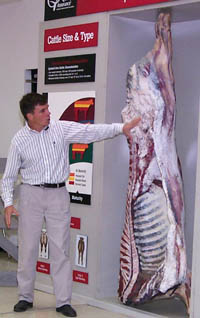Interactive Displays Teach Total Quality Management Practices
Interactive Displays Teach Total Quality Management Practices

The University of Kentucky's Research and Education Center in Princeton, Ky. has an ongoing commitment to providing education about total quality management practices for beef cattle producers.
In a recent meeting at the center, extension specialists interpreted detailed, life-like displays constructed by Auburn University. Through a grant from the Kentucky Department of Agriculture, the Kentucky Farm Bureau was able to make these displays available to UK Cooperative Extension.
The displays had three themes: Proper Management Enhances Beef Quality and Product Value; Targeted Breeding Equals Customer Satisfaction; and Responsible Culling Improves Herd Productivity and Efficiency.
Roy Burris, animal science specialist in Princeton discussed proper management and used display models to show producers how to properly give injections, how to avoid bruising cattle with prods, castration and dehorning basics, and the difference between freeze branding and hot-iron branding.
"Injection site lesions decrease the good eating experience of the steak," Burris said. "Give injections in the neck, in front of the shoulder. Follow injection instructions, but if they says either give subcutaneous or intramuscular, always stay out of the muscle when you can."
Burris recommended to never give more than 10 cc in one location, because that's where you get into some problems. He also suggested castrating and dehorning cattle at an early age and using freeze brands in place of hot-iron brands to maintain hide value.
Darrh Bullock, UK beef specialist, used a life-size carcass replica to discuss desirable carcass traits and muscling scores of beef cattle. "We're trying to produce a good, high-quality, safe product. We can do it through management and also through a breeding program," Bullock said. "We don't fatten out a lot of cattle here in Kentucky, so we don't' get a lot of opportunity to see a carcass and factors that go into the end product. Many of us seem to forget about it when it leaves the farm."
Bullock said although most of the feedlots in the US are the Midwest High Plains regions, there are programs that will allow a producer to follow his cattle through the feedlot phase and see how the performed and finished, even retain ownership of that animal if they desire.
Kevin Laurent, Extension associate in Princeton, discussed culling practices. He compared the beef herd and the producer to a corporation. Producers should only keep the most productive and efficient cattle in the herd. The display showed healthy and unhealthy examples of eyes, feet, udders, mouths and teeth. He said weaning time is a good time to check cattle for problems.
"You really need a decent set of working facilities; a good head gate, with a good chute, to restrain the cattle for good quality checks," Laurent said. " If we don't' have good handling facilities, we probably aren't serious enough to be in this business, considering the competition we face."
Producers attending the meeting were grateful for such graphic, interactive displays.
"I'm a retired adult Young Farmer instructor," Arthur Slaughter, Caldwell County, said. "We use all the practices discussed here tonight. It is to our advantage to practice good beef quality assurance all the way from the time the calf is born until it leaves our farm."
"We're losing a lot of our sales to chicken and fish," Bruce Guess, Marion, Ky. added. "Anytime we can learn to do a better job, it is to our advantage."
The traveling displays will go back to Auburn once they have traveled to a few more Kentucky locations. Call your county Extension office to find out if the displays will be close to you in the near future. If you have questions about beef quality management, your county agents are very equipped to help you deal with production concerns.